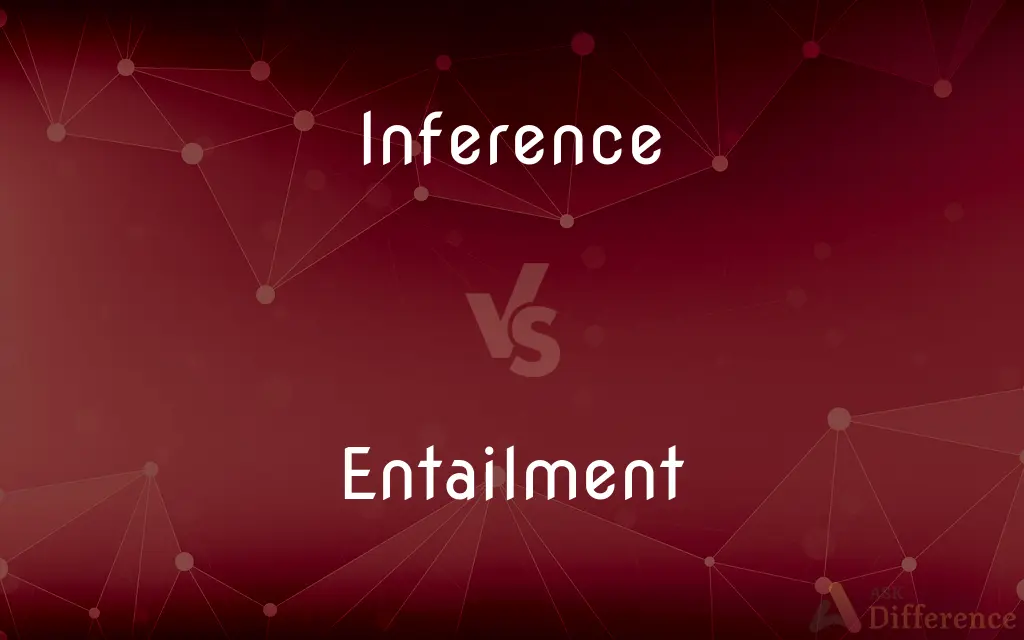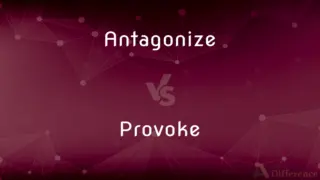Inference vs. Entailment — What's the Difference?

Difference Between Inference and Entailment
ADVERTISEMENT
Compare with Definitions
Inference
Inferences are steps in reasoning, moving from premises to logical consequences; etymologically, the word infer means to "carry forward". Inference is theoretically traditionally divided into deduction and induction, a distinction that in Europe dates at least to Aristotle (300s BCE).
Entailment
To have, impose, or require as a necessary accompaniment or consequence
The investment entailed a high risk. The proposition X is a rose entails the proposition X is a flower because all roses are flowers.
Inference
A conclusion reached on the basis of evidence and reasoning
It seemed a fair inference that such books would be grouped together
Researchers are entrusted with drawing inferences from the data
Entailment
To limit the inheritance of (property) to a specified succession of heirs.
Inference
The act or process of deriving logical conclusions from premises known or assumed to be true.
ADVERTISEMENT
Entailment
To bestow or impose on a person or a specified succession of heirs.
Inference
The act of reasoning from factual knowledge or evidence.
Entailment
The act of entailing, especially property.
Inference
Something inferred.
Entailment
The state of being entailed.
Inference
Usage Problem A hint or suggestion
The editorial contained an inference of foul play in the awarding of the contract. See Usage Note at infer.
Entailment
An entailed estate.
Inference
(uncountable) The act or process of inferring by deduction or induction.
Entailment
A predetermined order of succession, as to an estate or to an office.
Inference
(countable) That which is inferred; a truth or proposition drawn from another which is admitted or supposed to be true; a conclusion; a deduction.
Entailment
Something transmitted as if by unalterable inheritance.
Inference
The act or process of inferring by deduction or induction.
Though it may chance to be right in the conclusions, it is yet unjust and mistaken in the method of inference.
Entailment
The act of entailing, the state of being entailed, or something that is entailed.
Entailment does not imply causation: if a set of premisses entail a conclusion, that does not mean (necessarily) that they cause that conclusion to be true.
An argument hinges upon entailment whereas an if-then sentence hinges upon implication.
Inference
That which inferred; a truth or proposition drawn from another which is admitted or supposed to be true; a conclusion; a deduction.
These inferences, or conclusions, are the effects of reasoning, and the three propositions, taken all together, are called syllogism, or argument.
Entailment
The act of entailing or of giving, as an estate, and directing the mode of descent.
Inference
The reasoning involved in drawing a conclusion or making a logical judgment on the basis of circumstantial evidence and prior conclusions rather than on the basis of direct observation
Entailment
The condition of being entailed.
Entailment
A thing entailed.
Brutality as an hereditary entailment becomes an ever weakening force.
Entailment
Something that is inferred (deduced or entailed or implied);
His resignation had political implications
Share Your Discovery

Previous Comparison
Antagonize vs. Provoke
Next Comparison
Kell vs. Vell













































